S s G v n Living WITH LUPUS
TIS THE SEASON OF GRATITUDE
Practice ways to have gratitude during the holidays and spread cheer / p. 15
YEAR END GIVING CAMPAIGN
Celebrate our 45th Anniversary and learn about our trailblazing history / p. 07
LETTER FROM SUZANNE
Find out what our CEO is thankful for this year / p. 01
DECEMBER 2022
ISSUE 11
I was asked to make this edition of our Winter Living with Lupus Magazine about the topics that define the season, such as thankfulness, gratefulness, and giving.
Did you know there is a difference between being thankful and grateful?
The word “thankful” is defined in the Oxford Dictionary as “pleased and relieved.” The word “grateful” is defined as “showing an appreciation of kindness.”
Tis the season for giving or is it…… really receiving? Let us have a conversation about this.

Now that Thanksgiving is past, your mailboxes and emails are being flooded with donation requests from dozens of non-profit organizations. I know mine is. Many will even send you gifts when you donate to them. Why are donation requests sent during this time of year? Because non-profit organizations recognize that some donors may be motivated to give in order to claim these donations on their tax returns next year. But is this a meaningful reason for giving? Is this the only way to give?
Personally, I think what the entire world needs right now is LOVE. We will circle back to this, I promise.
Now more than ever, the world needs more patience, compassion, forgiveness, and generosity. All of these equate to love. Many people are suffering mentally and emotionally as a result of the COVID-19 pandemic and the environment we are all living in. One conceivable way to alleviate much of this suffering is to show generosity to others. According to experts, generosity can have a positive impact on an individual’s well-being. There are many benefits to giving, and this includes improving the health and financial well-being of not only the receiver but the giver too.
When the economy is harsh and a global pandemic lingers on, it becomes even more challenging for everyone. This is especially true if you are an organization that depends on donations to support its mission and for those who depend on the organization’s programs and services. What supporters need to know, and we need to emphasize is the incredible impact that contributions provide – even small donations. No matter the size of donation, donors can own the fact that they have an impact on the organization’s initiatives - and they can feel good about the donation they give. This is so powerful during challenging times. It is not the size of donation, but it is the willingness to give at any level. You do make a difference.
I will not lie to you. My recent messaging has often been about our flagging economy, the problems we are facing, and all of the unknowns that continue to plague our country. I realize that the tone and scope of my messaging have been increasingly depressing. This depressing tone is not all from our current situation, however. Know that I am first a fellow Lupian and that I do suffer from depression. But I recognize that, as your leader, I need to lead by example. Most of the time, I think I do a decent job at it.
So, this brings me back to my statement about LOVE. Many of you might remember the song by Dionne Warwick, “What the World Needs Now is Love.” I suggest you go ahead and Google it. Take some time to listen to it. I played it three times. It has stuck with me all month. I keep looking for reasons and solutions to all the challenges that everyone is confronted with on a daily basis.
So, what do we do with all these challenges? We do what we can with what we have. We do something. We give
Greetings Everyone and Happy Holidays!
Suzanne
something. It is about trying to impact all that is going on around us. We do not sit around and expect someone else to take the wheel to get us back on course. We are the ones that take the wheel. We are the drivers in our lives.
Do your part to reduce the world’s daily stresses – and your own – by giving. No matter how much or how little you can give, no matter what you can give or how you can give, you have the power to touch the life of another person. You can affect them in ways you may never be completely aware of.
So, money is tight. Ok, I get that. What about your time? The holidays may be the most poignantly lonely time of year, but the rest of the year may be even more challenging because those are the days that drag on and on. Go to your local nursing home or elderly care facility. Read a book with someone, take a new friend for a walk or wheelchair stroll, or play games like mahjong. (If you do not know how to play, I am sure someone would love to spend an hour showing you how . . . and then beating you.) You could even just drive someone to the doctor or to an appointment s/he might not otherwise be able to attend easily.
An invitation to a meal with your family, a birthday party, or any other occasion is a wonderful way to welcome someone into your home and life. It does not have to be an everyday thing to make someone feel loved and looked after.
Volunteer to assist in a program that is happening in your community or neighborhood, whether a beautification project, a food drive, or any number of other projects. If you are looking for programs and activities, check out your local YMCA or community centers. You can even volunteer at the chapter’s headquarters in Brecksville, Ohio. We would love to have you join us in the many tasks that need to be done.
Finally, set up time to see people and be social. Give of yourself by helping your loved ones celebrate the holidays and each other. Spend more quality time with friends and family. Keep in mind that this sometimes increases rather than decreases stress. Be sure to set healthy boundaries and do only as much as you can manage.
As you can see, when we are asked to give, do not assume that only a check will do. I encourage you to stop and reflect on the many ways people have given to you and how you can give to someone else, no matter the size, method or manner. However you give, whatever you give, you can be an effective force in the world today.

Sure, the chapter would love to have you include us in your year-end donations. I promise you the dollars will be well spent. This year, we have provided many programs and worked toward removing barriers to care for many fellow lupians from our lupus community in Ohio. We can do more with more. Above all, please take my advice. I want you to love more. We all could use some love. After all, what the world needs now is love, sweet love . . . for everyone.
Wishing you love and a wonderful holiday season. May better health always be the path ahead of you.
 Suzanne Tierney President & CEO
Suzanne Tierney President & CEO
Lupus Foundation of America, Greater Ohio Chapter
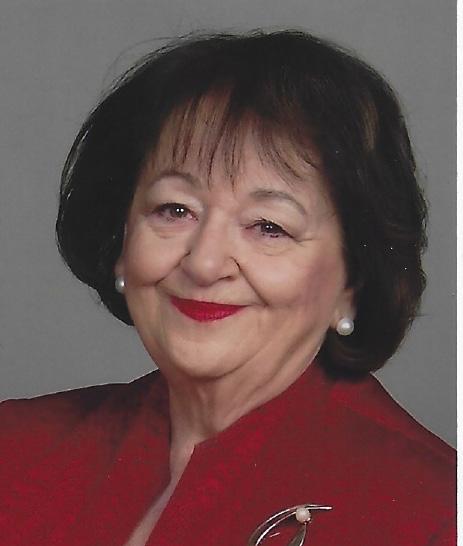


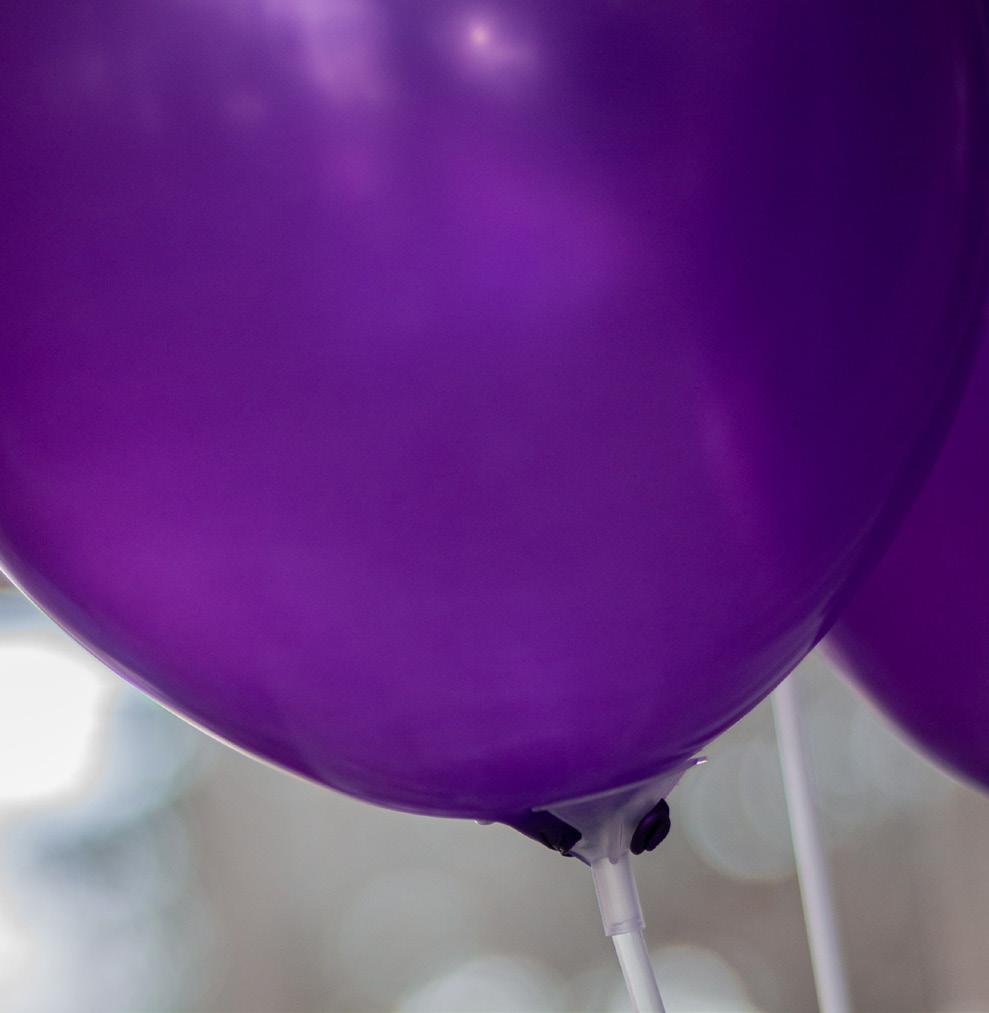

CONTENTS Pg. 1 - 2 Letter from Suzanne Pg. 4 New Mental Health Program Pg. 5-6 Patient Navigator Corner Pg. 7-8 Walk to End Lupus Now® Pg. 9-12 45 Year Anniversary Celebration Pg. 13-14 GSK Pg. 15 - 16 The Connection Between Giving and Gratitude Pg. 17-18 Patient Story: Kelly Perhach Pg. 19-22 Research & News Pg. 23-24 Get Involved and Ways to Give Pg. 25 Winter Bucket List Pg. 26 Staff Page 25 9-12 5-6 Patient Navigator Corner 45 Year Anniversary Celebration Winter Bucket List 15-16 Giving and Gratitude 3 LIVING WITH LUPUS MAGAZINE
The Lupus Foundation of America, Greater Ohio Chapter k nows how challenging it is, emotionally and mentally, to live with a chronic illness This is why we have established a par tnership with Signature Health to ensure that Ohio lupus patients have access to mental health suppor t.
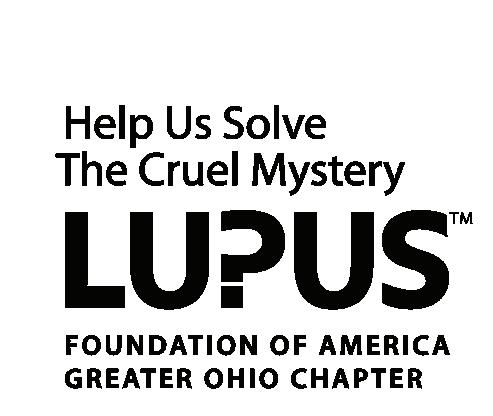

health, and addic tion recover y and primar y care ser vices to people across Ohio, via telehealth and in-person at locations in Ashtabula, Beachwood, Lakewood, Maple Heights, Painesville, and Willoughby They have a team of experienced counselors, case managers, psychiatr y providers, and nurses who work together to provide compassionate care.
The program will provide a 90-minute diagnostic evaluation to help determine the best mental health ser vices for you. I f you do not have a Medicaid or Medicare insurance plan that is accepted by Signature Health, the Lupus Foundation of America, Greater Ohio Chapter will cover the costs of the evaluation and t wo counseling sessions per month for a period

Mental health matters, especially when dealing with a chronic illness. To take advantage of this program,
Contac t the Lupus Foundation of America, Greater Ohio Chapter at 1-888-NO -LUPUS or email Info@LupusGreaterOhio.org
If this is a life -threatening emergenc y, please go to your nearest emergenc y room or dial 911. For non- emergenc y situations (domestic violence, food/shelter, etc.), dial 211 to speak to a live operator. If you are experiencing suicidal thoughts, call or tex t the National Suicide and Crisis Lifeline by dialing 988. You can also chat at 988-lifeline.org.
4 LIVING WITH LUPUS MAGAZINE
PATIENT NAVIGATOR CORNER
We are introducing a new feature to the magazine: the Patient Navigator Corner. In this section, we will highlight resources and information that are helpful to lupus warriors and their families and friends.
Are you newly diagnosed with lupus and want to know more about the disease and how it is diagnosed, treated, and managed? Are you a family member or friend and want to learn more about lupus? Maybe you have been diagnosed for a long time, and you want a refresher course? The Lupus Foundation of America, Greater Ohio Chapter provides comprehensive information about lupus, in print, online, and virtually. Three of these very useful resources are the Lupus Patient Information Packet, the Toolkit for Patients and Caregivers, and the New Patient Education Class.
Lupus Patient Information Packet
The Lupus Patient Information Packet is a folder of printed material that we send out to your mailing address. It contains general information about lupus and about the Greater Ohio Chapter. It can also contain some information customized to your needs. Here is a list of possible information that you can find in the Lupus Patient Information Packet:
• Understanding Lupus
• Treating Lupus
• Coping with Lupus
• Living with Lupus
• Could You Have Lupus? (English and Spanish)
• Services Provided to Lupus Patients
• Living with Lupus Magazine
• Physician Directory
• Specific Topics
• African Americans and Lupus
• Asians and Lupus
• Hispanics and Lupus (English and Spanish)
• Lupus and the Cardiopulmonary System
• Lupus and the Gastrointestinal System
• Lupus and the Musculoskeletal System
• Lupus and the Renal System
• Lupus and the Nervous System
• Lupus and the Skin
• Lupus and Clinical Depression
• Lupus and Men
• Lupus and Pregnancy
• Lupus and Children
• Lupus and Teenagers
The Toolkits for Patients and Caregivers

The Toolkit for Patients provides lupus information, resources, and support. Some of the information and resources found on the Toolkit for Patients webpage are:
• Covid 19 and Lupus
• Aurinia ALL IN™ for Lupus Nephritis - Patient Support Program
• GSK Us in Lupus Program
• Be Fierce. Take Control - lupus awareness campaign for young, undiagnosed, African American and Latino women
• Take Charge - a weekly education email series for people with lupus, including those recently diagnosed
• Lists of Statewide and County Resources
5 LIVING WITH LUPUS MAGAZINE
• Physician Directory - A list of some physicians in the State of Ohio who treat lupus patients
• Medication Toolkit
• Clinical Trials Information
• Ohio Financial Assistanceprograms and resources for the State of Ohio
• National Financial Assistance

• Support Groups
https://lupusgreaterohio.org/ find-resources/toolkit-for-patients/
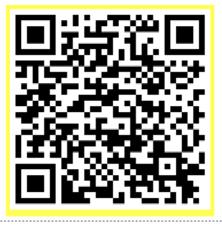
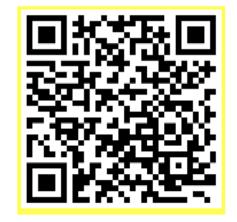

The topics include self-care, setting limits, how you can help, managing finances and legal matters for your loved one, and helpful forms and templates for tracking vital information.
https://lupusgreaterohio.org/ find-resources/toolkit-for-caregivers/
most recent information about lupus. Families and friends are encouraged to attend too!
https://lfaohio.salsalabs.org/newpatienteducation/index.html
The Toolkit for Caregivers is designed to provide those taking care of lupus patients with guidance, support, and advice. Whether you have been a caregiver for just a few days, or for several years, this resource is your guide to supporting a loved one dealing with lupus.
New Patient Education Class
Each month, we conduct a virtual 1.5 hour class for newly diagnosed patients. It is a “Lupus 101” class that covers basic information about managing the disease and living well. It is a great place to start when first learning about lupus. The class is not limited to newly diagnosed patients, though that is its main focus. The class is also a great way to learn about the
The Lupus Foundation of America, Greater Ohio Chapter is here to help you navigate learning about the disease. Together we can be successful at making the lupus journey manageable. For more information or to speak with a Patient Navigator, please contact us at 1 (888) NO-LUPUS, (440) 7170183 or email us at info@lupusgreaterohio.org.
6 LIVING WITH LUPUS MAGAZINE
THANK YOU TO EVERYONE WHO CONTRIBUTED TO ANOTHER SUCCESSFUL YEAR OF FUNDRAISING FOR THE WALK TO END LUPUS NOW®


The Walk To End Lupus Now® is an annual campaign held by the Lupus Foundation of America, Greater Ohio Chapter (LFA, GOC) to encourage continuous steps toward our shared vision of a world without lupus. The lupus community registers on a peer-to-peer fundraising platform meant to empower walkers to make an impact by setting campaign goals and working to raise funds in support of the LFA, GOC's mission of improving the quality of life for all people impacted by lupus. When walk fundraisers solicit donations, they experience firsthand the strength behind the movement to end lupus.
The 25th annual Walk to End Lupus Now® was a hybrid event held on Saturday, September 24th, 2022. Participants joined both online and in person at the Hofbrauhaus in Cleveland. We gathered at this exciting celebration to honor lupus warriors, praise one another for outstanding fundraising efforts, and rejoice in having made a huge impact!
The LFA, GOC Deeply Appreciates the Support of Our Incredible Sponsors!
Presenting Sponsors: GSK and Us in Lupus
Beverage Sponsor: Pepsi
Corporate Sponsors: Assurant and Midwest Global Distribution
Corporate Friends: Harmony Homes and Willoway Nurseries, Inc.
Shout Out to Our Entertaining Performers!
Mckinley Tate from MT3 A/V Services
Musical Guest, OG Shanksta
Matthew Edick from Wizbang!
Balloon Artist from Phillips Celebration
Volunteers Are the Heart of Our Organization. Special Thanks to Our Event Day Helpers!
7 LIVING WITH LUPUS MAGAZINE
Special Thanks to Our Top Fundraisers
• Ariel and Tammy Shelton (Team: A Beautiful Storm)
• Melissa Wright (Team: Wright Up Lupus)
• Leslie Vizcarra-Tierney (Team: Lupus Angels)
• Marybell Moyet (Team: Flare Fighters)
• Kelly Perhach and Craig Snyder (Team: Just a Little Lupie)
• Cheryl Caton
• Elizabeth Bertke
• Tanya Quinones-Santiago (Team: Dr. Q's Lupus Warriors)
• Tina Grant (Team: MAD - Making a Difference)
• Laura Biernacki (Team: Knockout Lupus) Your
Join the 2023 Walk To End Lupus Now® Committee


We hope to make the 2023 Walk To End Lupus Now® our best event yet.

Are you interested in helping us?
We work with our National office in Washington DC to make lupus research a priority. There is much exciting news on the horizon in terms of lupus drug development and treatment options. It is more important than ever to support research efforts.
The Walk To End Lupus Now® is the LFA, GOC’s biggest fundraising campaign every year. In addition to financing the next medical breakthrough, the Walk To End Lupus Now® contributes to the LFA, GOC’s ongoing programs, providing vital patient support services until a cure is found. Reach out today to partner with the LFA, GOC as a member of the 2023 Walk Committee!
Contact the Walk Coordinator, Victoria Hornikel
Victoria@LupusGreaterOhio.org
(440) 717-0183
8 LIVING WITH LUPUS MAGAZINE
makes a positive impact on the
support
millions of people living with lupus.
Cheers Lupus Supporters
ANNIVERSARY LETTER
A MESSAGE FROM OUR CEO
,
I’m so delighted to share that our Chapter is celebrating its 45th anniversary! I can hardly believe it. What a privilege it has been to see the progress that has been made in the ght against lupus. Perhaps you do not know this, but currently, I have the longest tenure here at the Lupus Foundation of America, including its Chapters and National sta and board members. Many say I am the historian of this wonderful Foundation across the nation. We never know where life is going to take us. At the age of 27, doctors told me to go home because they had no clue how to treat or manage my lupus and that I would only have a few years to live. Who knew that I’d be alive and well today?

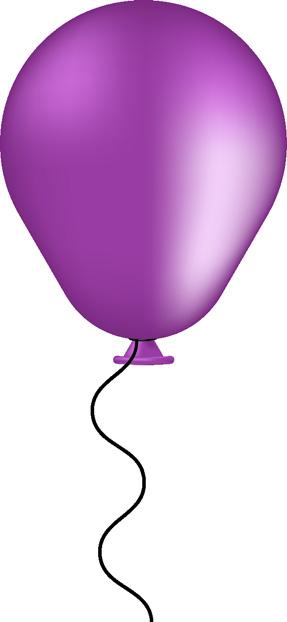



I am bursting with the knowledge and history of this organization and remember all those that have gone before me, worked alongside me, and continue to work hard to achieve our mission laid out before us. We have done our best to pick out some highlights to share with you from our 45 years. This is just a drop in the bucket. The real stories are of those I meet with lupus and their struggles and triumphs! Forty- ve years and we are just getting started. It has been a long road and I feel blessed to nally see the fruits of our labor. We are one of the nation’s leading Chapters in the area of programming and patient services. Much more work needs to be done and we can do it together. While we wait to nd a cause and/or a cure for lupus, the Chapter stands ready to assist lupus patients and their caregivers and families.
If you are ever in the Cleveland area and have anything to share from one of the other eight original Ohio Chapters that helped pave our path, I would love to hear it from you. Just give me a call or shoot me an email. I always have time for you. I am so thankful for all those that were here in the early years. Because of their dedication, passion, and commitment to the cause, we are here today. Join us in celebrating 45 years of great success. This is a big read and I hope you see the value of this wonderful organization by supporting it today and perhaps in the future. Thanks to all of you from all of us. After all, there is no I in lupus, only us.
Tierney, President & CEO
9 LIVING WITH LUPUS MAGAZINE
With tremendous gratitude,
Suzanne
THE LFA,GOC TRAILBLAZING BEGINS
In 1977, the Chapter started as a grassroots organization of friends and family of lupus patients. The Sagaris family of Cleveland was one of the founding members and they are still involved today.




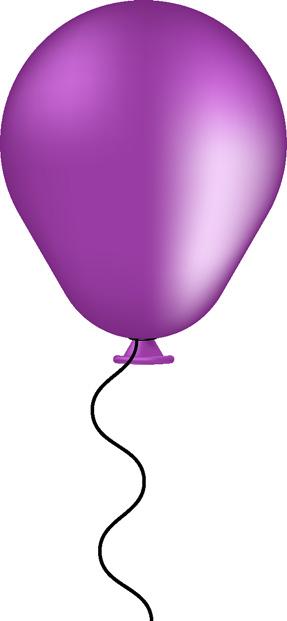
MEETING HELD IN CLEVELAND, OHIO


During 1986, the Lupus Foundation of America held their national convention in Cleveland, Ohio for the rst time. Ninety-two Chapters were in attendance representing twenty- ve nations.
1ST TECHNICAL SUPPORT SUMMARY

During 2016, the Ohio Lupus Needs Assessment was developed to learn more about the public health burden of lupus and promote better health outcomes of Ohioans with lupus.


 APPROVED BY FOOD & DRUG ADMINISTRATION
APPROVED BY FOOD & DRUG ADMINISTRATION
In 2021, three medications were approved for lupus patients. Benlysta for lupus nephritis, Saphnelo™, and Lupkynis™. Never before have this many medications been approved. A positive step for lupus patients.
CELEBRATING YEARS OF TRAILBLAZING
It’s 2022! For our 45th Anniversary, we’d like to celebrate the gift of giving and highlight a few milestones made at our chapter. We worked hard but couldn’t have made it without you.

10 LIVING WITH LUPUS MAGAZINE
Lupus Foundation of America, Greater Ohio Chapter Timeline

Over the past four and a half decades, the Lupus Foundation of America, Greater Ohio Chapter (LFA, GOC) has collaborated with our nationwide chapter network and the Lupus Foundation of America (LFA) National Office to accelerate delivery of medicines with more than 70 potential therapies being studied and more than 400 lupus research studies conducted at 100+ medical institutions. Together, the Foundation has also stimulated $550 million in federal funding for lupus research and education, and supported research studies and fellowships to find a cure for lupus.
1977 - The Greater Cleveland Chapter was formed. A small group of lupus patients and their family and friends came together to form this Chapter. As a grassroots organization they laid out a vision for the fight against lupus. Nothing was being done at the time. There was one little orange booklet about lupus and the fear was that lupus lifespan was only five years.
There were as many as eight other Chapters in the State of Ohio. Little by little they merged or closed their doors. The fight was real and the resources were few. The Greater Cleveland Chapter was the only one that was able to sustain the pressures and the needs of the lupus movement in Ohio. Today you know it as the Lupus Foundation of America, Greater Ohio Chapter.
2009 - This milestone was a game changer for the lupus movement. LFA commissioned a series of individual interviews and a convention gathering lupus experts from around the world to discuss challenges related to improving lupus treatments. The report and resulting recommendations was titled “Overcoming the Barriers to Drug Development in Lupus.”
2014 - LFA launched Lupus Science & Medicine,® a global, peer-reviewed, open access lupus journal from LFA that publishes papers on all aspects of lupus and related diseases. This milestone gave practitioners validated information to provide an arsenal to better treat lupus patients.
2016 - Thanks to the lupus community and advocacy initiatives the LFA, GOC was awarded funds from the State of Ohio budget to conduct the first ever Ohio Lupus Needs Assessment to determine the true burden of lupus on patients in Ohio.
2017 - Congress responded to LFA efforts and created the Lupus Research Program through the Department of Defense (DoD). This program was allocated $10 million toward two years of research with the goal of improving understanding, preventing, and diagnosing lupus and improving treatments and life for patients. It was an honor to send the LFA, GOC CEO, Suzanne Tierney to the first peer review funding in Washington D.C. to be the voice of lupus patients as a key speaker and grant reviewer. These dollars today continue to grow as LFA continues advocacy initiatives with state and national legislators.
The Ohio Department of Health awarded the LFA, GOC in partnership with RAMA Consulting, continued funding for a statewide Lupus Education for Healthcare Professionals CME/CEU initiative and six lupus educational summits across Ohio. This accomplishment came to fruition from the efforts of those who rode a bus to Columbus, Ohio to meet with state legislators and share their lupus stories.
2018 - The LFA, GOC formed over 50 partnerships with state and healthcare agencies; provided lupus education to over 460 healthcare professionals; and distributed a lupus toolkit to over 5000 healthcare providers. It also created a lupus awareness campaign for the entire state, to create needed awareness for lupus.
2022 - During the global pandemic, LFA did not waver from its mission. The staff and volunteers all continued on the path to help those impacted by lupus and were ecstatic when three new medications for the treatment of lupus became available and approved by the FDA.
MAGAZINE 12 LIVING WITH LUPUS MAGAZINE
Where we are at today:
Research is one of the overarching objectives at the LFA. There have been many projects that have been funded and quite a few of those projects were conducted here in Ohio. Investigators have contributed to many of the major advances in lupus treatment and diagnosis over the past forty years. These studies have supported development of the first diagnostic test for lupus, identified specific risk factors for cardiovascular disease in African American women with lupus, and discovered biomarkers to identify people at higher risk for lupus kidney disease. New treatment options have been discovered including the first U.S. based clinical trial of mesenchymal stem cells (MSC) as a potential new treatment for lupus, urgently needed treatment plans for children with lupus, especially those with kidney disease, and stimulated the first study on cognitive issues in diverse populations with lupus, raising awareness of cognitive dysfunction and its relationship to employment and disability.
June 13, 2022:
The biotechnology company, Thermo Fisher Scientific Inc., announced its new diagnostic blood tests for lupus were approved by the FDA. The EliA Rib-P test helps identify lupus by detecting a specific lupus-related antibody in people who are antinuclear antibody (ANA)-negative.
June 30, 2022:
The Committee on Appropriations in the U.S. House of Representatives has demonstrated a strong commitment to funding lupus priorities, including:
• $10.5 million for the National Lupus Patient Registry at the Centers for Disease Control and Prevention (CDC)
• $2 million for the National Lupus Training, Outreach, and Clinical Trial Education Program at the Office of Minority Health (OMH)
• $47.5 billion for the National Institutes of Health
July 27, 2022:
The FDA has approved the drug Benlysta (belimumab) for the treatment of lupus nephritis (LN) in children and teens aged 5 to 17, who are receiving standard therapy. Benlysta is a human monoclonal antibody that was first approved in 2011 as a treatment for adults with lupus, and was approved to treat lupus nephritis in adults in 2020. It is now the first and only approved biologic for both adults and children. https://www.lupus.org/news/breaking-news-fda-approves-benlysta-for-children-with-lupus-nephritis
August 29, 2022:
LFA and Lupus Canada awarded the 2022 Lupus Canada Catalyst Grant to Éric Boilard, Ph.D., Professor at Université Laval in the Department of Microbiology and Immunology and researcher at Centre de Recherche du CHU de Québec, for his critical study examining platelet biology as a potential lupus treatment pathway.
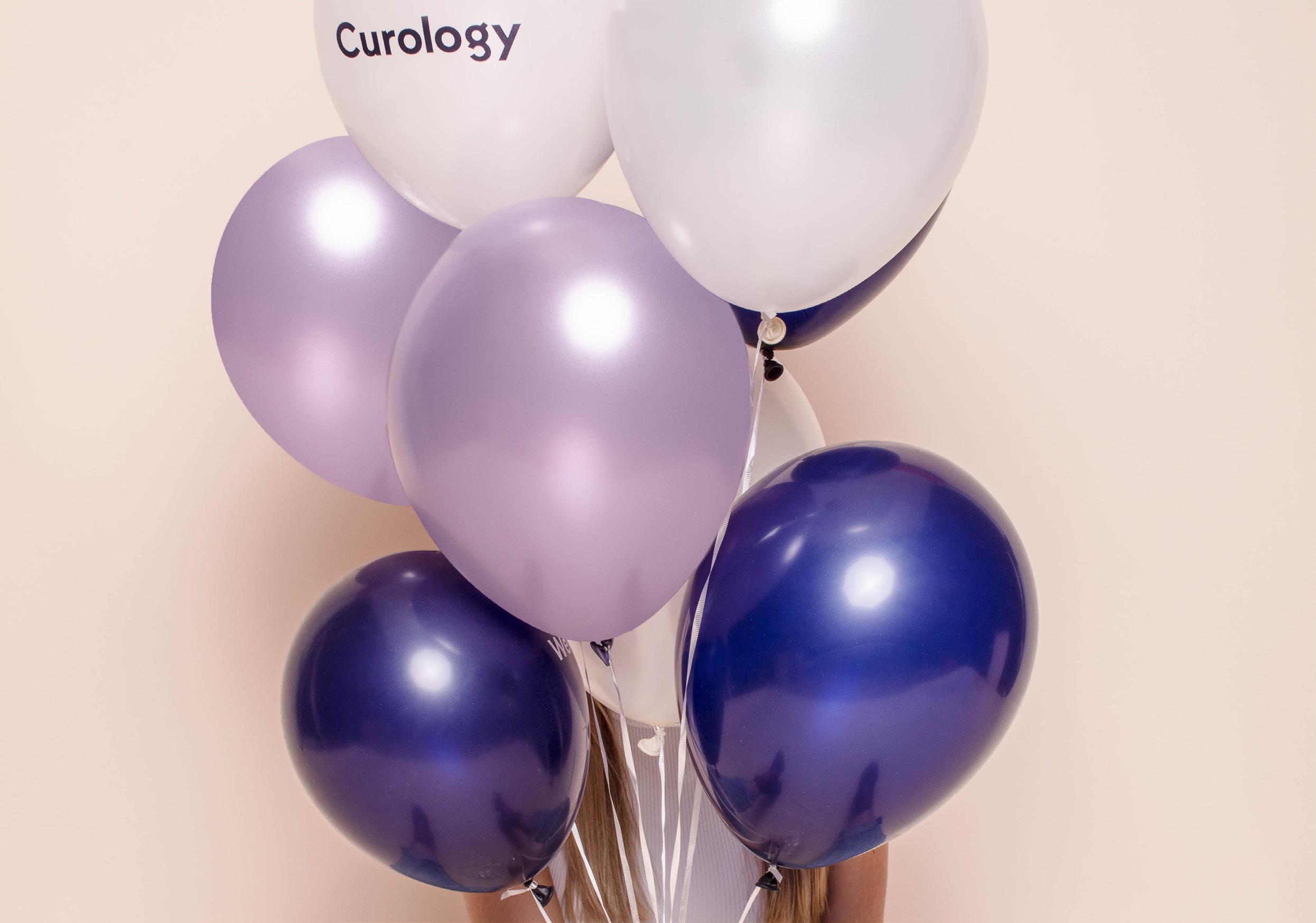
12 LIVING WITH LUPUS MAGAZINE
Community focused. Devoted to patients.
“Everyday is a new day to be ambitious for patients as we understand behind every educational effort, is an opportunity to improve the life of a patient, their family, and an entire community.
- Sherrita Dorsey, RN, MSN, FNP
US Specialty, Advocacy, and Patient Engagement Lead

Get to know the GSK PEL Team
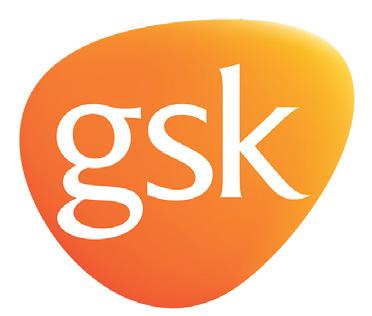

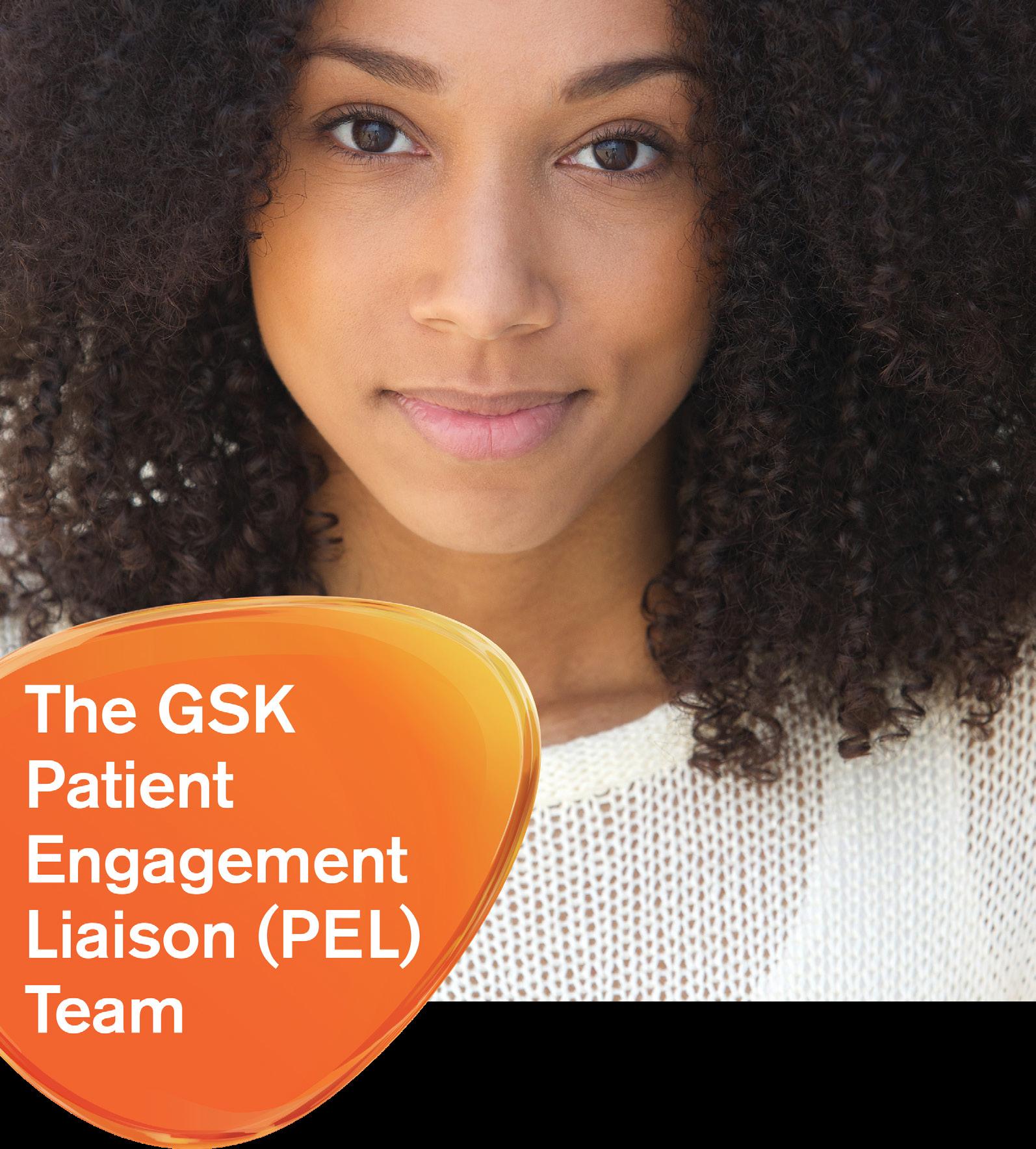
We’re
The PEL Team at GSK is devoted to supporting patient and patient advocacy groups where that support is needed most, particularly in rare diseases and in communities especially burdened by unmet health needs.
We work directly with patients to help engage them in their healthcare and build vital relationships. Our goal is to educate and motivate patient so that they are as well-prepared as possible to advocate for themselves.
We are healthcare professionals on a mission.
The PEL Team is comprised of healthcare professionals with more than 100 years of combined experience and a passion for patient education and advocacy.
“I love that my job allows me to make an impact by helping patients become more knowledgeable and developing self-confidence in managing their disease.”
- Angelia Drake, RN, MSN, DNP US Specialty, Director Community Engagement & Strategy
Providing education that informs and empowers
PEL Team members are available to:
Deliver presentaions and exhibits
Provide patient education rescources and tools
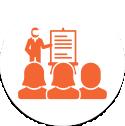
Offer live or virtual education programs
We focus on rare disorders such as systematic lupus erythematosus (SLE) and eosinophilic diseases-helping to support earlier diagnoses in patient and expand awareness.
MAGAZINE 13 LIVING WITH LUPUS MAGAZINE
working with you to help improve each patient’s journey.
GSK Patient Learning And Community Education Hub

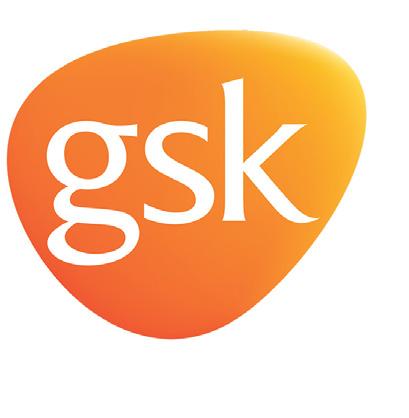
The GSK PLACE Hub includes English and Spanish tools and rescources to help educate, activate, and empower patients:
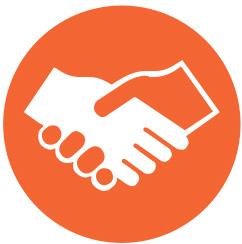

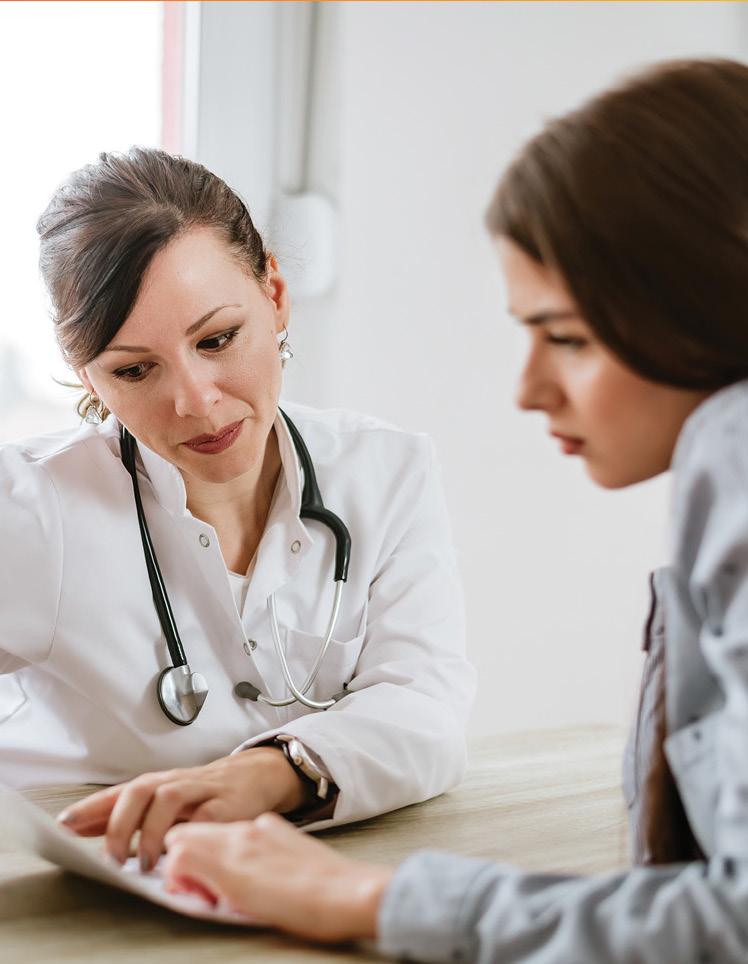
Webinars and podcasts with our PEL team, other experts and patients
and insurance Information on shared decision making and communication
Videos, brochures, and resources designed with patients in mind

@2022 GSK or licensor.
gskPLACEhub.com
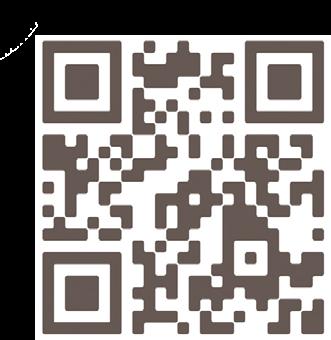
LIVING WITH LUPUS MAGAZINE 14
with your patients! Discover the...
Share the GSK PLACE Hub
Trademarks are owned by or licensed to the GSK group of companies.
APBROC220002 March 2022 Produced in USA. Connect with your PEL Team! Reach out today. Let us know how we can help you.
The Connection Between Giving and Gratitude
 By Adrienne Rice-Fernandez Lead Project Coordinator & Lupus Patient
By Adrienne Rice-Fernandez Lead Project Coordinator & Lupus Patient
It’s the time of year when giving is on everybody’s mind. It often feels overwhelming to be asked to donate to so many causes. Feed the hungry, clothe the poor, and do more. How does one even begin to feel worthy if they have little to give? For some, this time of year brings feelings of inadequacy. I don’t have enough to give my own family; how can I possibly give more? Or I’m struggling with my lupus, I can’t possibly be expected to give more of myself. Then the guilt sets in. It’s a delicate balance between altruism and mental and physical stability. Tis the season, right?
According to Psychology Today, “There is significant scientific literature showing that people who feel gratitude are less likely to be depressed and worried, and more likely to feel satisfied with their lives.” (Psychology Today, 27 June 2017).
Training the brain to have gratitude is, in essence, an important component of framing the mind toward giving. It becomes an essential element of a person’s psyche. In fact, most scientific studies and research over the past decade support the idea that people who practice gratitude have fewer physical symptoms of illness, less depression, and a more positive outlook. They achieve more and stress a lot less.
But the question remains, with so much pressure to give and so much daily stress in our lives, how can we accomplish what seems impossible? How can we give more money and time when we ourselves have less? The answer is kind of simple... start small.
To begin, stop thinking in terms of gratitude having to be big. Everything in the United States is big. Big money, big giving, big attitude, big car. The bigger the
better as we say. But the truth is, it’s learning to appreciate the small things in life. For example, perhaps the lottery came and went without your numbers being called, but maybe you did find an extra $20.00 in your coat pocket last week. No, that $20.00 won’t solve all your problems, but it may buy you that extra cup of coffee or pay for that expensive box of cereal your child wanted last week. Having gratitude for small blessings makes us appreciate the little things that make life so incredible.
Practicing gratitude is not always easy. It’s not hard to look at the world around you and think I wish I had a bigger house, or I wish I could walk better, but my joints just won’t cooperate. With gratitude, again, we start small. Instead of thinking I wish for this or that, a person who thinks with a grateful mind will be found thanking the universe for their blessings. They will stop and say thank you for even the smallest
MAGAZINE 16 LIVING WITH LUPUS MAGAZINE
of successes. A lupus patient might wake up and say thank you to God for allowing them a day with fewer aches and pains. Or they may take advantage of their flare-free day by running to the store or going for a walk. Even when they are down, they think up. Is this easy? Not necessarily but training the brain to focus on small successes and wins, frames the mind towards an attitude of gratitude.
Once we’ve found our inner grateful nature, we can connect this to all aspects of our lives, including giving during the holiday season. Again, start small. There are so many advertisements and friends asking for money. The key is to make a budget and choose one or two special charities. Believe it or not, five dollars is a big deal for

a non-profit. You’d be amazed at how much these small donations make a difference. Sometimes the greatest donations are those made of your time. A donation does not have to be monetary. Volunteering an hour of your time is an incredible way to give back. Charities, churches, and other social organizations have all kinds of projects that volunteers can help with. Including projects for those with differently abled bodies and/or illnesses.
The greatest donation one can possibly make is lending a listening ear or supporting a friend going through a difficult time. Lupus patients often feel like they don’t have the ability to do as much as others. Sometimes there is truth in this. But there are flare-free times
when patients can give of their heart. They can pick up the phone and call a lonely elderly neighbor or friend in need. They can contact a fellow lupus patient and provide empathy. Truly, giving is best when it comes from the heart without anything expected in return.
Practicing gratitude is learning how to see the glass half full. It’s cultivating your mind to appreciate the little things in life. If you focus on what you don’t have, you’ll never have enough. If you focus on what you do have, your heart will always be full. Perhaps it’s best said by the late Archbishop Desmond Tutu, “Do your little bit of good where you are; it’s those bits of good put together that overwhelm the world.”
16 LIVING WITH LUPUS MAGAZINE
PATIENT STORY Lupus Warrior Kelly Perhach


My lupus journey started when I discovered bruises all over my legs which were painful and I couldn’t explain how they got there, as well as severe weight loss. I went to the doctor they did some blood work and determined that in fact, I had some -
thing going on. I was diagnosed with Systemic Lupus Erythematosus in September 2019.
On my bad days (there are more of them than good days) I can barely walk and am not motivated to do anything. I have
deep depression that makes me lash out for no reason. I have days where I must hold on to everything to walk because I’m in so much pain. Consistent headaches, swelling, bruising, and weight gain are my new normal. I had to cut back or give up some of the foods I love. These are some of the issues I have. God gave me this for a reason and I will fight this every step of the way, as he is guiding me through it.
Months later I discovered I had bumps all over my body. My rheumatologist sent me to see the dermatologist and after many appointments, biopsies, and two different doctors they determined not only did I have SLE, but I also had bullous lupus, which is a rare skin disease. The bumps are painful and itchy. Since then, my skin has cleared up, but I do have scars. If they come back, I’m supposed
17 LIVING WITH LUPUS MAGAZINE
to call the dermatologist immediately.
I spent months crying and hiding away from the world. It didn’t matter what anyone said to me, I felt like I was doomed, a lost cause, and a burden. I lost a lot of family members and friends over it because they were scared to be around me and didn’t understand. Since then, I’ve made it a priority to educate as many people as I can about this horrible, cruel disease.
Don’t let me fool you, I had no idea what lupus was before my diagnosis. I spent countless hours reading on the internet. Then I came across the Lupus Foundation of America, Greater Ohio Chapter. They have many tools and resources available. Through their support, I was blessed to do the walk, raise money to find a cure, and spread awareness in Ohio. Now, I have tremendous support from my family, friends, and the Lupus Foundation. Without them I wouldn’t be the person I am today; you all know


who you are, and I want to say thank you! Three years doesn’t seem to be a lot of time, but to me, it’s a struggle every day, I just don’t show it. My mission in life is to see my grandbaby grow up, inform others about this disease, and help find a cure.
I will leave you with this...
“Always remember you are braver than you believe, stronger than you seem, smarter than you think, and twice as beautiful as you’ve ever imagined” - Dr. Seuss
18 LIVING WITH LUPUS MAGAZINE
“My mission in life is to see my grandbaby grow up, inform others about this disease, and help find a cure...”
RESEARCH & NEWS
Health Literacy Linked to Trust in Physicians Among People with Lupus

New research among people with lupus shows that health literacy (HL) plays a key role in shaping trust in one’s rheumatologist. HL is defined as the degree to which individuals have the capacity to obtain, process, and understand basic health information and services needed to make appropriate health decisions.
Researchers looked at HL data from 362 people with lupus and assessed how different forms of HL were associated with trust in one’s own physician and in physicians in general:
• Functional HL: the ability to read or understand the instructions or leaflets from healthcare providers, hospitals, and pharmacies.
• Communicative HL: the ability to extract and communicate health information with doctors or the family.
• Critical HL: the ability to critically analyze health information and use it to make decisions.
Among study participants, functional HL scores tended to be highest, followed by communicative HL and critical HL. Higher functional HL scores were associated with greater trust in one’s own physician, and higher communicative HL scores were linked with more trust in both one’s own physician as well as doctors overall. Interestingly, higher critical HL scores were associated with lower trust in physicians generally, but not lower trust in one’s own rheumatologist.
People who trust their healthcare providers have been shown to demonstrate good medication adherence, disease self-management, and favorable disease outcomes. The latest study findings suggest that, by adapting their communication to match each patient’s HL level, physicians can help build more trust and promote better health outcomes in people with lupus.
Coming to medical appointments with your health information and questions prepared ahead of time can also help you make the most out of your time with your doctor. Learn how to get ready for your next doctor’s appointment.
https://www.lupus.org/resources/ get-ready-for-your-next-doctors-appointment
19 LIVING WITH LUPUS MAGAZINE
Biologic Therapy, Telitacicept, Found to be Effective and Safe Potential Treatment Option
for Lupus
New research finds the biologic therapy, telitacicept, effective, well tolerated, and safe as a potential treatment of lupus, especially lupus nephritis. Biologic therapies use substances made from living organisms like proteins and antibodies, versus conventional drugs, which are chemically made. Telitacicept targets B cell activity which are responsible for creating antibodies, including autoantibodies, and are thought to play a role in the development and progression of autoimmune diseases.
Researchers in China administered the therapy to twenty people with lupus. After 4 to 45 weeks of treatment, the group saw an overall improvement in disease activity and required lower doses of other commonly used medications such as corticosteroid and immunosuppressive drugs (43% no longer required immunosuppressive treatment). Urine protein levels also declined after treatment in the group, and seven participants saw improved renal (kidney) function.
Expanding effective and safe treatment options for lupus is important. Continue to follow the Lupus Foundation of America for updates on telitacicept and learn more about medications used to treat lupus.

20 LIVING WITH LUPUS MAGAZINE
Lupus Research News from ACR’s 2022 Scientific Meeting
The American College of Rheumatology’s (ACR’s) annual meeting always promises exciting updates in lupus science, and this year was no exception. From November 10 – 14, world experts in lupus research, treatment, care and advocacy convened to share the latest news and signal future directions for the field.
The Lupus Foundation of America (LFA) was a proud supporter of several studies presented at this year’s ACR Convergence. Our Inside Lupus Research team covered the conference, and we’ve brought you the biggest highlights below.
Lupus Treatment News 2022 was a year of tremendous progress in lupus drug development, from emerging therapies to treatment strategies for targeted populations. For example, Dr. Jane Salmon, presented preliminary research findings from her IMPACT Study, supported by the LFA, demonstrating the safety of certolizumab during pregnancy in women with or without lupus who have lupus anticoagulant present in the blood or have antiphospho -
lipid syndrome.
Other exciting lupus treatment news included:
• Car-T cell therapy: Genetically altered cells called CAR-T cells show promising results for people with severe lupus that do not respond to standard treatment. The procedure was well tolerated among study participants and initial results suggest that it may lead to long-term, drug-free remission.
• Hydroxychloroquine: The drug continues to prove an effective lupus treatment. Higher average yearly doses were associated with lower disease activity scores as well as lower incidence of heart events and stroke.
• Anifrolumab: Pooled data from two Phase 3 drug trials demonstrated nearly 10% of people treated with anifrolumab (Saphnelo) achieved remission, emphasizing that achieving periods of few or no symptoms with lupus is possible.

• Voclosporin: The latest data shows that Hispanic and Latino people with lupus respond well to voclosporin (Lupkynis). Re -
searchers presented an analysis of the drug’s effectiveness within this population and reported faster response and sustained benefits for up to 3 years.
• Deucravacitinib: The drug is now moving on to a Phase 3 trial after Phase 2 data showed it was safe, well tolerated and effectively lowered disease activity in people with active systemic lupus erythematosus (SLE).
• Cenerimod: Phase 2 trial results found that the drug was generally well tolerated in people with moderate to severe SLE.
• Telitacicept: The novel drug to treat SLE met its Phase 3 study endpoints when used in combination with standard therapy, clearly outperforming the placebo and demonstrating it was well tolerated by study participants.
Patient-Centered Research from LFA and Partners
LFA shared novel research findings and program insights from its on line community LupusConnect™ .
The virtual forum offers a space where individuals with lupus and their loved ones can engage with
21 LIVING WITH LUPUS MAGAZINE
others like them to share experiences, find emotional support and discuss practical insights for coping with the daily challenges of the disease.
In the abstract, LupusConnect: A 24/7 Online Lupus Support Community, LFA investigators presented popular topics discussed by more than 18,000 community members with a self-reported connection to lupus from 2017 through 2022. The top terms discussed across both US and non-US members were lupus, pain, and symptom(s). During the pandemic, community membership and engagement remained strong, underscoring a need for connection within the lupus community.
LFA also shared research in partnership with Systemic Lupus Erythematosus International Collaborating Clinics (SLICC) and ACR. This ongoing collaboration is aimed at updating the SLE organ damage index, which is a tool used to predict damage accrual for people with lupus. The current project focuses on identifying specific measures that reflect organ damage in adult, young-adult and pediatric populations living with lupus. Hundreds of lupus experts from around the world have now identified 220 unique measures for 14 organ systems, providing future researchers and healthcare professionals an even more robust system for accurately predicting damage accrual. The project demonstrates the importance of including large, diverse groups for such processes to ensure an inclusive breadth of viewpoints are considered.
As a patient-facing advocacy organization, the LFA has also been working on the Treatment Response Measure for Systemic
Lupus Erythematosus (TRM-SLE) project, providing guidance on the development of a new clinician-reported outcome measure for lupus clinical trials and ensuring the patient voice is incorporated. Dr. Kathryn Connelly, who co-leads the work, discussed the project and how it aims to improve the measurement of treatment benefits in future lupus trials.
Novel Approaches to Lupus Research & Care
Much of the research shared at this year’s conference explored new ways of approaching lupus science and patient outreach, care, and education. One study demonstrated that telemedicine (medical care provided remotely) can offer an effective method for people with lupus to seek care, resulting in fewer missed healthcare appointments and increased lab use. The findings suggest telemedicine may be a potential strategy to improve continuity of care within the lupus community, especially among those with barriers to healthcare access.
In fact, a separate study assessed the impact of adapting the Treatment and Education Approach for Childhood-Onset Lupus (TEACH) program to be delivered remotely. Researchers found the remote format promoted high retention rates, and children who completed the program benefitted from a reduction in fatigue, mood symptoms and pain.
The novel genomics-based web tool MyPROSLE was presented at the conference. This cutting-edge tool analyzes various data, including the genetic information of people with lupus, and researchers demonstrated that that disruptions in certain gene groupings are strongly associated with specific
lupus symptoms and areas of disease activity., The tool is intended to help physicians determine more individually tailored treatment options for each patient.
Health Disparities within Lupus
The science continues to show there are significant gaps in disease management and outcomes along racial, ethnic and socioeconomic lines. One study found that Black people with lupus are less likely to take medications as needed. Compared to White people with lupus, Black people faced more barriers to following their prescribed medication regimen and reported greater mistrust about medications.
Another study found that people with SLE and vulnerable socioeconomic and home environments are more likely to be prescribed higher doses of prednisone, a drug which can contribute to a higher burden of damage. Socioeconomic status was measured by income, poverty, employment, education; and household composition was measured by age, single parenting, and disability.
The latest research urgently highlights the need for more strategically targeted efforts to improve access to care, treatment and disease management education in underserved and under-represented communities.
We are excited to be a part of the energy and passion driving the lupus community forward toward better treatments, disease outcomes and ultimately a cure. Keep your finger on the pulse of developing and life-changing lupus research and follow the Lupus Foundation of America’s Inside Lupus Research for breaking news and important updates.

22 LIVING WITH LUPUS MAGAZINE
Email Sign-Up
Stay up-to-date on everything we’re doing by joining our mailing list. You will receive a monthly newsletter, support group reminders, Walk to End Lupus Now® updates, research news, and more. Sign up now: lupusgreaterohio.org/stay-informed
Text Message Notifications
Text “NOLUPUS” to 833-4490800, complete your contact information, and be sure to opt in to receive important lupus updates directly to your mobile device.
Get Social
Join us on our social media platforms to stay connected: lupusgreaterohio.org/stay-informed/ get-social
Instagram.com/lupusgreaterOH
Facebook.com/lupusgreaterOH Twitter.com/lupusgreaterOH
Become a Member
One-year: $25 Lifetime: $200 lupusgreaterohio.org/get-involved
GET INVOLVED
JOIN THE COMMUNITY
Host a Third-Party Event
Do you have an idea to support the mission? Give us a call at the office to discuss and plan your own fundraising activity to benefit the LFA, GOC. Here are a few examples of virtual events that people have coordinated in the past: Pampered Chef Party, Online Auction, Charity Video Game Tournament.
If you are interested in hosting a third-party event, reach out to us for our official guidelines and an application.
Advocacy
Each year, the National Lupus Advocacy Summit brings together the lupus community to pursue a collective vision of a world without lupus. In addi-
tion, we help to ensure there is a cohesive voice heard in Washington D.C. that ensures the lupus agenda is at the forefront of the legislature. This year’s National Lupus Advocacy Summit was held June 26 - 28 and featured a few of our amazing Ohio advocates. Thank you to those who participated!
We invite you to register to be a lupus advocate in Ohio. Our current initiative is to keep lupus in the state budget for the new biennium. Much of the educational and support programming produced by the LFA, GOC over the past two years has been a direct result of the funding provided by the state of Ohio and the Ohio Department of Health. It is imperative that we let Ohio’s leadership know the importance of keeping lupus in the public health agenda. lupusgreaterohio.org/ get-involved/advocate
23 LIVING WITH LUPUS MAGAZINE
Traditional
• Checks
Please make checks payable to the Lupus Foundation of America, Greater Ohio Chap ter, and mail them directly to 12930 Chippewa Road, Brecksville, Ohio 44141.
• Credit Card + PayPal
Fill out the online donation form or call the office.
Through Your Job
•
Ask your employer if they match charitable contributions made by their employees.
• Combined Federal Campaign CFC #51890
Investing
• Stock or Other Securities
• Life Income Plans Pooled Income Fund Charitable Remainder Trusts
• Creating Healthier Communities CHC #9963
• United Way Campaigns
Other
• Amazon Smile
• Donatestuff.com
Schedule a donation pickup of your gently used goods and pick the LFA, GOC as your charity.
• Leave a Bequest You can include the LFA, GOC in your will to support the mission beyond your lifetime.
• Give the Gift of Life Insurance Name the LFA, GOC as a sole or partial beneficiary.
For more information on ways to give, please visit lupusgreaterohio.org/get-involved/donate or contact the office.
24 LIVING WITH LUPUS MAGAZINE
WAYS TO GIVE
• Facebook Fundraisers • Instagram Stories In Honor of • Memorial Donation • Tribute Donation
Employer Matching Gift Program
SENDS AN INFORMATIONAL PACKET $5 HELPS A LUPUS PATIENT WITH TRANSPORTATION $45 PROVIDES FINANCIAL AID FOR MEDICATION CO-PAYS $100 EQUIPS LFA,GOC PATIENT NAVIGATORS WITH TRAINING $250 $500 SUPPORTS 8 NEW PATIENT EDUCATION CLASSES $1,000 FUNDS EDUCATIONAL SUMMITS FOR OHIO
25 LIVING WITH LUPUS MAGAZINE Winter Bucket List 30 DAY HOLIDAY CHALLENGE 01 02 03 04 05 06 07. 08. 09. 10. 11. 12. 13 14 15 16 17 18 25 26 27 28 29 30 07 08 09 10 11 12 07. 08. 09. 10. 11. 12. 19 29 21 22 23 24 This season work on your winter bucket list! Cross o as much as you can and snap photos along the way. Share the fun to us at info@lupusgreaterohio.org and we’lll give you a shoutout on our social platforms! Are you up for the challenge?
Leslie Vizcarra Vice President of Operations & Patient Navigator Leslie@lupusgreaterohio.org
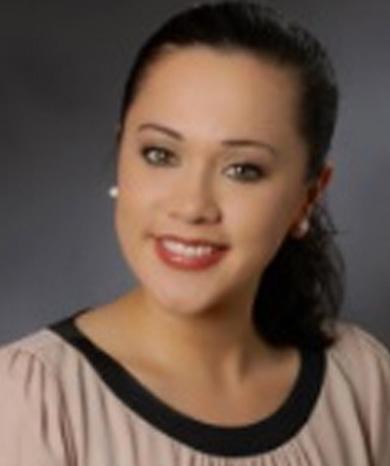
I’m a registered nurse and have a BSN from Ohio University. My primary role is to help people understand lupus and provide general health education. I strive to build working relationships, solve problems and support patients while they learn how to best manage their symptoms. I started volunteering for the LFA, GOC over 20 years ago. My dedication is driven with a passion to help fight lupus and was inspired by all the people I have met along the way.
Suzanne Tierney, CEO/President Suzanne@lupusgreaterohio.org
I have spent the last 30 years dedicated to the lupus patients in Ohio. The goal is to provide a better quality of life until a cause or cure for lupus is found. My passion is providing programs to empower those affected by lupus so that they will have a better journey with lupus through education and emotional support. Lupus does not have to be a lonely, miserable, and misunderstood illness. My goal is to provide my chapter with the tools and resources to provide such services to all those in the state of Ohio.
truly rewarding because I know my efforts have a direct effect on our community members. I’m a jack of all trades and help with everything from database management to marketing efforts to event help.
LIVING WITH LUPUS MAGAZINE
 Holmes Finance Manager Kathy@lupusgreaterohio.org
Holmes Finance Manager Kathy@lupusgreaterohio.org
I was diagnosed with lupus in 1989 and joined the Lupus Foundation of America, Greater Cleveland Chapter the same year. I have been able to grow with the organization, as it became the LFA, GOC. Knowing how important it was to have somewhere to turn when I was first diagnosed is what motivates me to do all I can to help our chapter continue in our mission. Being in remission for the past 20 years has enabled me to take an active part in the growth of our chapter.
Willis Creative Design Manager
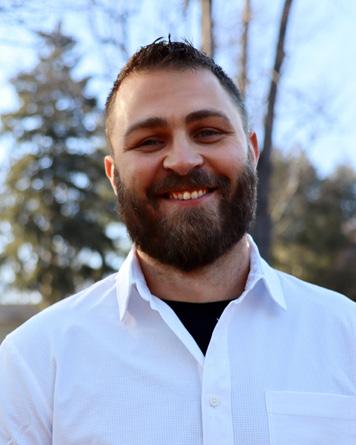 Mackenna@lupusgreaterohio.org
Mackenna@lupusgreaterohio.org
I’m the marketing manager and creative developer when it comes to strategizing new ideas for Lupus awareness. As a graduate from Bowling Green State University with a BFA in graphic design, I’ve always envisioned utilizing my skills to make a difference. My enthusiasm to help others through design has always been a passion of mine and having the opportunity to share and grow with the LFA, GOC team has been nothing but inspiring.
Victoria Hornikel Fundraising and Events Coordinator
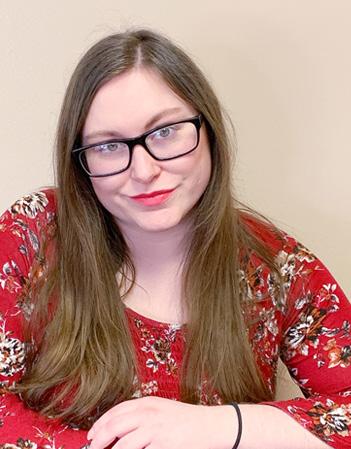
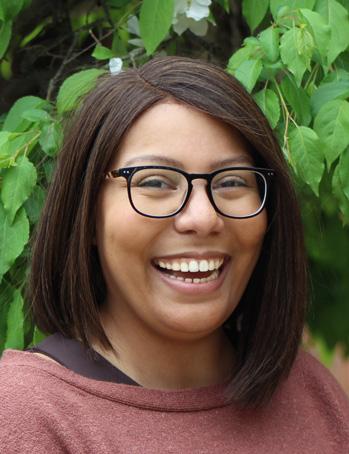
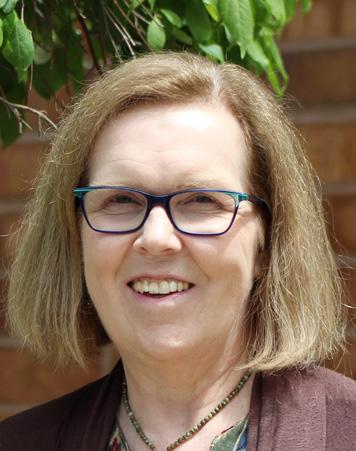 Victoria@lupusgreaterohio.org
Victoria@lupusgreaterohio.org
With a lifelong passion for service, I found the Nonprofit Administration program at Cleveland State was perfect for me. After obtaining my degree, I began working with the LFA,GOC. I was truly blessed to start my career learning from this brilliant team of skilled and passionate lupus advocates. After some time away from the Foundation, I am so happy to be back working on this mission. I can’t wait to connect with fellow supporters in the fight to end lupus, and I hope to see you at the next gathering of lupus warriors.
Acree Community Outreach Coordinator Aletha@lupusgreaterohio.org
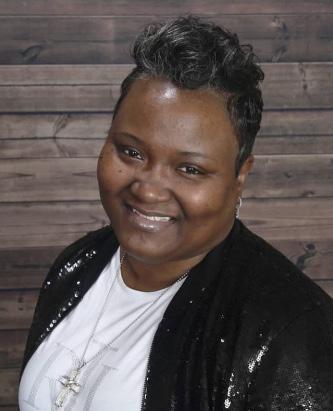
I am the devoted mother of two wonderful sons, they are the reason I fight lupus daily. I share my story everyday hoping that it might help or encourage someone else on their journey. I try to leave lupus patients with these thoughts and that is keep your environment positive in all aspects and do what you can while you can!
Acevedo Digital Assets Manager Alex@lupusgreaterohio.org
As the digital assets manager I assist our team with anything in the digital space. After studying business management and marketing at Kent State University, I realized my passion was to help small businesses and other local organizations. I spent 11 years in the pet care industry working primarily in the boarding, grooming, and veterinary spaces. I joined the LFA, GOC team to help our chapter continue to grow and help lupus patients for years to come.
24
Aletha
Alex
Kathy
Mackenna
Lupus Foundation of America, Greater Ohio Chapter 12930 Chippewa Road, Brecksville, OH, 44141 Phone: (440) 717-0183 Tollfree: 1 (888) NO-LUPUS FOLLOW
THANK YOU FOR READING OHIO’S LUPUS MAGAZINE! FOR THE MOST UP-TO-DATE INFORMATION FROM THE WORLD OF LUPUS, PLEASE VISIT US AT WWW.LUPUSGREATEROHIO.ORG THE FUNDING FOR THIS CAMPAIGN IS FROM AN EARMARK FROM THE STATE OF OHIO AND MANAGED BY THE OHIO DEPARTMENT OF HEALTH. EMAIL INFO@LUPUSGREATEROHIO.ORG WITH ANY QUESTIONS OR CORNERNS. GET IN TOUCH!
OUR SOCIAL MEDIA @lupusgreaterOH


 Suzanne Tierney President & CEO
Suzanne Tierney President & CEO
















































 By Adrienne Rice-Fernandez Lead Project Coordinator & Lupus Patient
By Adrienne Rice-Fernandez Lead Project Coordinator & Lupus Patient










 Holmes Finance Manager Kathy@lupusgreaterohio.org
Holmes Finance Manager Kathy@lupusgreaterohio.org
 Mackenna@lupusgreaterohio.org
Mackenna@lupusgreaterohio.org


 Victoria@lupusgreaterohio.org
Victoria@lupusgreaterohio.org



